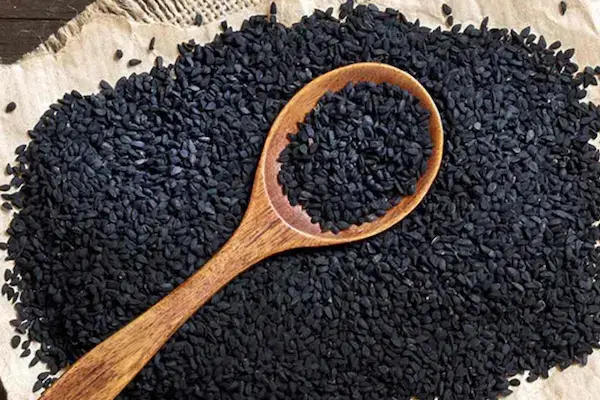The Health Benefits of Nigella Sativa
Nigella Sativa is an ancient seed that has been revered for centuries by cultures around the world for its potential health benefits. Originating in the Mediterranean and Western Asia, nigella seeds were known as "black seed" due to their dark color and were used by ancient cultures like China and Arabia for medicinal purposes. Known as Kalonji seeds in India, Nigella seeds have been recommended traditionally across the world and it is no surprise to see modern science uncover several benefits including antioxidant properties.
The first recorded use of Nigella Sativa dates back to over 3,000 years ago in ancient Egypt, where it was reportedly used for its ability to alleviate common ailments. Nigella seeds were believed to have healing powers and were used to treat everything from digestive issues to respiratory problems. Despite its long history of use, it's only in recent years that scientific research has begun to uncover the full extent of its potential health benefits.
The History of Nigella Sativa
For over 3,000 years, Nigella Sativa has been a staple of ancient Egyptian culture, revered for its culinary and medicinal properties. Nigella seeds were even used in burial rituals for their supposed protective powers. Ancient Greece's Hippocrates, the father of medicine, also recognized Nigella Sativa's potential and prescribed it for digestive disorders calling it "Melanthion".
Nigella Sativa was known by various names and had different uses in different cultures. It is mentioned in the Gospel of Matthew, the Book of Isaiah, the Chinese called it Hei Zhong Cao and used it to alleviate headaches, toothaches, and indigestion, while in Arabia it was referred to as Habbat Al-Barakah or "the blessed seed," having been mentioned by Prophet Muhammad (PBUH) in Hadith as a seed that can heal every disease except death.

In fact, Nigella Sativa, also known as Black Cumin Seeds, is a plant that was prevalent across north Africa, the Levantine region, the Indian subcontinent and Southwest Asia. Nigella Sativa has been found in the tomb in the ancient Egyptian Pharoah Tutankhamun, with experts believing that it was probably a component of ancient Egyptians' mummification process due to the preservative and anti-bacterial properties inherent to it.
What Does Modern Science Say About Nigella Sativa?
Modern scientific research has unraveled the remarkable properties of Nigella Sativa, shedding light on its bioactive compounds that contribute to its unique qualities. Among these compounds, thymoquinone has emerged as one of the most extensively studied components. Its therapeutic potential spans a wide range of health benefits, making it a subject of great interest in the field of nutrition and dietetics.
Antioxidant Powerhouse: Thymoquinone's Role
Thymoquinone stands out for its potent antioxidant effects, which play a crucial role in safeguarding the body against oxidative stress and combating chronic diseases. Oxidative stress arises from an imbalance between harmful free radicals and the body's antioxidant defense mechanisms. Remarkably, scientific studies have demonstrated that thymoquinone acts as a potent free radical scavenger, effectively neutralizing these harmful molecules and mitigating oxidative stress. By doing so, it safeguards against cellular damage, supports overall health, and promotes well-being. In a study conducted on rats with liver damage, thymoquinone was found to have a protective effect on the liver, reducing oxidative stress and inflammation. Another study found that thymoquinone inhibited the growth of cancer cells in the prostate.


Anti-Inflammatory Marvel: Insights from Research
Chronic inflammation underlies various diseases such as rheumatoid arthritis, heart disease, and diabetes. Thymoquinone has shown immense potential as an anti-inflammatory agent, positioning it as a valuable tool for managing and preventing these conditions. Studies utilizing animal models have unveiled that thymoquinone can inhibit diverse inflammatory pathways and curtail the production of inflammatory markers within the body. By modulating the inflammatory response, Nigella Sativa and its key component, thymoquinone, hold promise in alleviating symptoms and contributing to the overall management of inflammatory diseases. In a study conducted on diabetic rats, thymoquinone was found to improve blood sugar levels and reduce oxidative stress.
Thymoquinone has also been found to have potential benefits for those with asthma. In a study conducted on patients with asthma, thymoquinone was found to reduce airway inflammation and improve lung function.
The potential benefits for heart health have also been confirmed in a study conducted on rats which found that thymoquinone had a protective effect on the heart, reducing inflammation and improving heart function. Thymoquinone has been found to have a beneficial effect on those with high blood pressure. In a study conducted on patients with hypertension, thymoquinone was found to reduce blood pressure levels.
Unveiling the Anticancer Potential: A Glimpse into Research
The prospect of Nigella Sativa in inhibiting the growth of cancer cells has captivated the scientific community again due to the compound Thymoquinone. It has exhibited promising anticancer effects in various studies including research focusing on prostate cancer cells which showed that thymoquinone can inhibit cell proliferation and induce apoptosis, or programmed cell death, in cancer cells. Findings from studies on breast cancer cells reinforce the potential of Nigella Sativa in cancer management. These discoveries provide a solid foundation for further exploration of the mechanisms and potential applications of Nigella Sativa in cancer treatment.
GET THE DIET & NUTRITION ADVICE YOU NEED
- All
- Diet and Nutrition
Further Reading & Research
Study on the Effect of Nigella Sativa
A meta analysis conducted in 2021 looked at the results of five studies with a total of 293 participants. The methodological quality of the studies was assessed using Jadad's quality scales, which indicated a low risk of bias and high quality of reported information.
The meta-analysis showed that treatment with Nigella sativa significantly increased the level of superoxide dismutase (SOD), an important antioxidant enzyme, compared to the placebo group. However, there was no significant effect on the malondialdehyde (MDA) level, a marker of oxidative stress, or the total antioxidant capacity (TAC) level.
This suggests that Nigella sativa supplementation whether with nigella seeds or black seed oil in humans may benefit as an antioxidant by increasing SOD levels. However, further research is needed to determine the effects of Nigella sativa on other oxidative stress and antioxidant parameters. In addition, the optimal dosage and duration of supplementation should be investigated to establish the clinical relevance of these findings.
Anti-Inflammatory Properties Of Nigella Seeds
Another study conducted in 2019 aimed to evaluate the antioxidant and anti-inflammatory properties of the oil extracted from N. sativa seeds produced in the Marche region of Italy and to determine if its biological activity would decay during storage. The researchers used an in vitro model of low-grade inflammation in human pre-adipocytes to test the cytotoxicity and anti-inflammatory properties of N. sativa oil.
The study found that fresh extracted oil (FEO) contained 33% more thymoquinone than stored extracted oil (SEO), indicating that storage can affect the oil's overall quality. In addition, the thymoquinone content in the N. sativa oil from the Marche region cultivar was higher compared to other N. sativa oils produced in the Middle East and other Mediterranean regions. The study also showed that the oil's capacity to counteract pro-inflammatory cytokine production does not solely depend on thymoquinone content, but also on other antioxidant components of the oil.

Previous studies have shown that N. sativa oil has anti-inflammatory, anti-oxidant, immunomodulatory, and anti-cancer activities. Recently, investigations have also suggested that N. sativa oil may improve glucose homeostasis and lipid profile. Pharmacological studies have highlighted that N. sativa oil can have gastroprotective, hepatoprotective, antitussive, cardioprotective, and anti-hypertensive properties. Additionally, N. sativa oil has been found to inhibit histamine release from mast cells, indicating its potential use in asthma.
Environmental factors such as soil composition and climatic conditions, as well as extraction procedures, can significantly affect the composition of the oil. Therefore, the thymoquinone content and biological activity of N. sativa oil can vary depending on the production region and the extraction method used. It is essential to consider these factors when evaluating the oil's antioxidant and anti-inflammatory properties. Overall, this study provides insight into the potential health benefits of N. sativa oil and the importance of its proper storage and handling to preserve its quality and biological activity.
